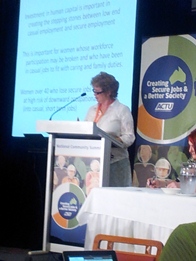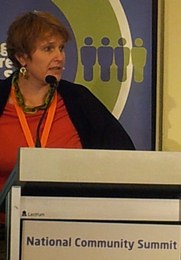The value of work done by childcare educators will be tested in a historic equal-pay case to be lodged with the industrial arbiter on Monday.
United Voice, the union representing childcare workers, will lodge a claim with the Fair Work Commission arguing that educators are paid less than people with comparable qualifications because of an outdated and sexist notion that childcare is something done by women in the home.
”If this were 68,000 blokes, there’s no way they’d be paid $19 an hour,” the national president of United Voice, Michael Crosby, said.
”Women have got choices. They’re not confined to teaching or nursing any more, and it’s only rational they would want to choose a career, not a minimum-wage job.”
The claim is the next step in the campaign to lift the wages of a group of workers who are among the lowest paid in the country.
A childcare educator with a Certificate III qualification is paid $19.07 an hour, about $10 an hour less than someone with comparable qualifications working in another area.
The claim asks that Certificate III qualified staff receive a $10 an hour pay increase, with lower per-hour increases for people with higher levels of qualifications.
The claim covers the 68,000 people working in childcare, not just those who are union members.
”Should the commission agree with the union’s claim, it would be up to the government of the day to decide whether or not it was prepared to provide funding to cover increased wages,” Mr Crosby said.
The union estimates that this would cost $1.4 billion a year, based on what happened last year following a successful claim made by the Australian Services Union covering about 120,000 workers in social and community service organisations.
”Our members are determined that the outcome shouldn’t be that parents end up paying for this increase. That would be utterly unfair,” Mr Crosby said.
Childcare centres are trying to meet new government regulations requiring them to employ more staff with higher qualifications. Turnover of staff in centres is typically high, with many citing low pay as the reason they leave.
The claim builds on the federal government’s recent offer of $300 million to fund wage increases.
But the plan has been controversial because it will only provide for pay increases of about $3 an hour for 40 per cent of workers until June 2015.
Melbourne childcare worker Kerrie Devir said she was used to seeing fellow workers stay for ”five or 10 years, then leave for a better paid job”.
”Early childhood education should be this intensely important time and we can only do so much on our own.”





